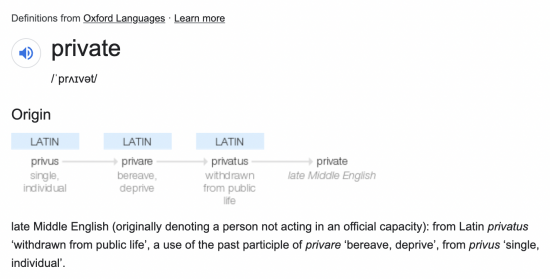I took part in an excellent seminar yesterday on the role of the Big 4 accountants.
Amongst those also presenting was Fabio de Masi, who campaigned on tax related issues when a member of the European Parliament. Amongst the issues he discussed was the role of the Big 4 accountants (PWC, Deloitte, EY and KPMG) in privatisation. Doing so he mentioned the etymology of the word 'private' from which the term privatisation is taken. It is fascinating and politically telling. This came up from a simple Google search:

The word's meaning as 'withdrawn from public life' seems particularly telling. So much of what should be public is private now. The withdrawal from public life has been deliberate. It has been the result of the pursuit of private gain. The loss is to society as a whole.
Thanks for reading this post.
You can share this post on social media of your choice by clicking these icons:
You can subscribe to this blog's daily email here.
And if you would like to support this blog you can, here:



The rise of privatisation has coincided with the rise of ‘corporatisation’ as I refer to it. So often now instead of ‘experts’ commenting in the media this role now falls to ‘the CEO of…’ as if you need to have the title to have a voice.
There are certainly big questions to be asked concerning who actually benefits from the public purse through the route of privatisation.
This accords with what I see happening within the NHS.
Public bodies are becoming fewer , they meet less often and the papers are less accessible; their decision making is escaping local government scrutiny, effective challenge and often is trapped within commercial and in confidence issues. By the time decisions are revealed it can be too late to challenge those decisions.
The most outrageous examples were in covid management where urgency was used to avoid scrutiny. Excess costs were c£90 bn in 2020/2021 and £76bn in 2021/22. In other countries with better governance it was a fraction of this.
e.g. France https://drees.solidarites-sante.gouv.fr/publications-documents-de-reference-communique-de-presse/panoramas-de-la-drees/CNS2022
It seems to me that many of the COVID excesses were in effect officially sanctioned theft from the public purse.
I agree
Most apt I must say.
Coming back from Holyhead this week, Crewe was a mess with Avanti trains all backed up one after the other. When you consider the fares being charged, it is unacceptable.
… leaving us in privation. Same stem?
Yes
Richard,
It’s worth quoting a parallel concept from Ancient Greece, the word “idiot”, the origin of which is very revealing.
For in ancient Greek, the word “idiotês” comes from the adjective “idios”, meaning “belonging to one’s self”, effectively “mine”.
So an “idiotês” was one who chose to withdraw from the community, and live a private life – but in a radical sense, that of not only ceasing to subscribe to community norms, but ceasing to be “political”, in the sense of being a “politês”, or citizen of the “polis” = the city state.
This is the real meaning of Aristotle’s phrase “man is a political animal” = naturally suited to living in a city state/small community, so roughly paraphrased, it meant someone who preferred small village life to large urban, even global existence, with those who did prefer urban/global existence being called “cosmopolitês”.
The important thing to note is that the life of an “idiotês” seemed so counter-cultural to an ancient Greek, tbat the original meaning “one who withdraws from involvement in society and the community” transformed into the modern meaning of “soft in the head”.
Thus the origin of the words “private” in Latin, and “idiot” in Greek, both ask the same question, namely what should the relationship between individual and community be, and come up with the same answer, which is that the individual and private are/should be, if not inextricably, then certainly organically related and intertwined.
In a word, too much privacy (privatisation?l)/individualism is detrimental to both the individual and the community, which I’d guess is the message of “The Spirit Level”.
Finding a (not THE, which doesn’t exist) balance/equilibrium between public and private, individual and community, is the second most important task for the global community, but expressed in a way that best suits each constituent community.
The MOST important task, of course, is ensuring the world has a future in which the second task can be carried out!
Absolutely fascinating
Thank you Andrew
excellent comment @andrew dickie !